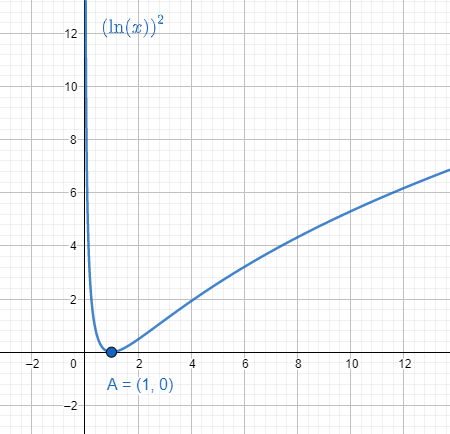
What is ${{\left( \ln x \right)}^{2}}$?
Answer
534.6k+ views
Hint: We first find the intercepts of the given function $f\left( x \right)={{\left( \ln x \right)}^{2}}$ which also gives us the roots of the function. Then we use the differentiation to find the extremum points of the function and draw the graph.
Complete step by step solution:
We need to find the zeros, y intercepts of the curve $f\left( x \right)={{\left( \ln x \right)}^{2}}$.
Here the zeroes mean the x intercepts or the roots of the polynomial.
We put the value of $f\left( x \right)=0$ and get ${{\left( \ln x \right)}^{2}}=0$ which gives the roots as $x=1$.
To find the y intercepts we have to put the value of $x=0$ but the logarithmic part of the function ${{\left( \ln x \right)}^{2}}$ is not defined at $x=0$. There are no y intercepts.
Therefore, to find the extremum points we have to find the first and second order derivatives.
Extremum points in a curve have slope value 0.
The slope of the function $f\left( x \right)={{\left( \ln x \right)}^{2}}$ can be found from the derivative of the function ${{f}^{'}}\left( x \right)=\dfrac{d}{dx}\left[ f\left( x \right) \right]$.
We differentiate both sides of the function $f\left( x \right)={{\left( \ln x \right)}^{2}}$ with respect to $x$.
$\begin{align}
& f\left( x \right)={{\left( \ln x \right)}^{2}} \\
& \Rightarrow {{f}^{'}}\left( x \right)=\dfrac{d}{dx}\left[ f\left( x \right) \right]=\dfrac{2\ln x}{x} \\
& \Rightarrow {{f}^{''}}\left( x \right)=\dfrac{d}{dx}\left[ {{f}^{'}}\left( x \right) \right]=\dfrac{2-2\ln x}{{{x}^{2}}} \\
\end{align}$.
To find the $x$ coordinates of the extremum point we take $\dfrac{2\ln x}{x}=0$.
The solution is $2\ln x=0$ which gives $x=1$.
Therefore, from the value of the $x$ coordinates of the extremum points, we find their $y$ coordinates.
The value of the ${{f}^{''}}\left( x \right)$ at $x=1$ is ${{f}^{''}}\left( 1 \right)=\dfrac{2-2\ln x}{{{x}^{2}}}=2>0$. The point at $x=1$ is the minimum value of the function.
Therefore, the extremum point is $\left( 1,0 \right)$.

Note: We need to remember that the curve changes its direction on the extremum points only. Other that the function $f\left( x \right)={{\left( \ln x \right)}^{2}}$ is an increasing function in the range of $x\in \left[ 1,\infty \right)$.
Complete step by step solution:
We need to find the zeros, y intercepts of the curve $f\left( x \right)={{\left( \ln x \right)}^{2}}$.
Here the zeroes mean the x intercepts or the roots of the polynomial.
We put the value of $f\left( x \right)=0$ and get ${{\left( \ln x \right)}^{2}}=0$ which gives the roots as $x=1$.
To find the y intercepts we have to put the value of $x=0$ but the logarithmic part of the function ${{\left( \ln x \right)}^{2}}$ is not defined at $x=0$. There are no y intercepts.
Therefore, to find the extremum points we have to find the first and second order derivatives.
Extremum points in a curve have slope value 0.
The slope of the function $f\left( x \right)={{\left( \ln x \right)}^{2}}$ can be found from the derivative of the function ${{f}^{'}}\left( x \right)=\dfrac{d}{dx}\left[ f\left( x \right) \right]$.
We differentiate both sides of the function $f\left( x \right)={{\left( \ln x \right)}^{2}}$ with respect to $x$.
$\begin{align}
& f\left( x \right)={{\left( \ln x \right)}^{2}} \\
& \Rightarrow {{f}^{'}}\left( x \right)=\dfrac{d}{dx}\left[ f\left( x \right) \right]=\dfrac{2\ln x}{x} \\
& \Rightarrow {{f}^{''}}\left( x \right)=\dfrac{d}{dx}\left[ {{f}^{'}}\left( x \right) \right]=\dfrac{2-2\ln x}{{{x}^{2}}} \\
\end{align}$.
To find the $x$ coordinates of the extremum point we take $\dfrac{2\ln x}{x}=0$.
The solution is $2\ln x=0$ which gives $x=1$.
Therefore, from the value of the $x$ coordinates of the extremum points, we find their $y$ coordinates.
The value of the ${{f}^{''}}\left( x \right)$ at $x=1$ is ${{f}^{''}}\left( 1 \right)=\dfrac{2-2\ln x}{{{x}^{2}}}=2>0$. The point at $x=1$ is the minimum value of the function.
Therefore, the extremum point is $\left( 1,0 \right)$.

Note: We need to remember that the curve changes its direction on the extremum points only. Other that the function $f\left( x \right)={{\left( \ln x \right)}^{2}}$ is an increasing function in the range of $x\in \left[ 1,\infty \right)$.
Recently Updated Pages
Master Class 12 Economics: Engaging Questions & Answers for Success

Master Class 12 Physics: Engaging Questions & Answers for Success

Master Class 12 English: Engaging Questions & Answers for Success

Master Class 12 Social Science: Engaging Questions & Answers for Success

Master Class 12 Maths: Engaging Questions & Answers for Success

Master Class 12 Business Studies: Engaging Questions & Answers for Success

Trending doubts
Which are the Top 10 Largest Countries of the World?

What are the major means of transport Explain each class 12 social science CBSE

Draw a labelled sketch of the human eye class 12 physics CBSE

Differentiate between insitu conservation and exsitu class 12 biology CBSE

Draw a neat and well labeled diagram of TS of ovary class 12 biology CBSE

Give 10 examples of unisexual and bisexual flowers




